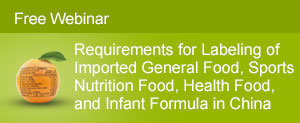According to the upcoming New Food Safety Law of the People's Republic of China implementing on October 1, 2015, dietary supplement should be registered or recorded for breaking into the Chinese market successfully. If importers or manufacturers don't try to register or record their dietary supplements, they will face huge fines. In order to achieve the success of registration or record, importers or manufacturers must prepare and submit the necessary and important specific dietary supplement quality standards to provincial or national FDA. Why is the new referred national standard GB16740-2014 so important for the dietary supplement importers or manufacturers? Because the new GB16740-2014 standard is the basis for compiling the Quality Standard of Dietary supplement registration in China and the most important role is that the new GB 16740-2014 standard provides the minimum requirements, specifications and guidelines for compiling the Quality Standard of Dietary supplement registration.
GB16740-2014 standard has been implemented on May 24, 2015. This new standard has ruled the test items, the test limit requirements, test methods and label requirements for each dietary supplement type (including liquid, capsules, tablets, pills, granules, paste, etc.).The specific contents of the new GB16740-2014 standard contain the ingredient quality requirements, product sensory testing requirements, physical and chemical testing requirements, pollutants (lead, cadmium, mercury, arsenic, tin, nickel, chromium, nitrite, nitrate, benzo [a] pyrene, N - dimethyl nitrosamine, polychlorinated biphenyls (PCBS), 3 - chloro - 1, 2 - propanediol) limits requirements, mycotoxins (aflatoxin B1, aflatoxin M1, deoxidization snow sickle germ enol, patulin, ochratoxin a and corn gibberellic ketene) limits requirements, microorganism (colony count, escherichia coli, mold and yeast, staphylococcus aureus, salmonella, etc.) limits requirements, food additives usage requirements, vitamins and minerals usage requirements, label requirements.
Compared with the old
standard GB 16740-1997, the specific changes of GB 16740-2014 collected by CIRS are shown as follows.
|
items changes |
Specific changes in the new GB 16740-2014 standard compared with the old GB 16740-1997 "General standard of dietary supplement (functional)" |
||
|
I |
Name changes |
The name of GB 16740-1997 "General standard of dietary supplement (functional)" is replaced by GB16740-2014"National food safety standards Dietary Supplement". |
|
|
II |
Range changes |
Simplify the description. |
|
|
III |
Referred standards and test methods changes |
Remove the original referred standard name and the test method, and annotate them after each specific test item. |
|
|
IV |
Definition changes |
I. Adopting the definition of the dietary supplement in the "Administrative Measure of Dietary Supplement Registration”. II. Delete the definition of active ingredient. |
|
|
V |
Categories changes |
Delete the product categories. |
|
|
VI |
basic principle changes |
Delete the basic principle. |
|
|
VII |
Technical requirements changes
|
Ingredient quality requirements changes |
I. Retain the original ingredient quality requirements. II. Delete the radioactive material limit requirements. |
|
food additives, vitamins and minerals usage requirements |
I. Single out food additives, vitamins and minerals usage requirements as independent clauses. II. Food additives usage requirements is not changed but vitamins and minerals usage requirements can be in line with the "and/or related standard" |
||
|
Product sensory test requirements changes |
The testing methods of sensory test requirements are increased, and sensory requirements should be presented in a tabular format. |
||
|
Function requirements changes |
Delete the function requirements |
||
|
physics and chemistry requirements changes |
I. Delete the net content requirements. II. Delete the active ingredient rules. III. Delete the nutrients rules. |
||
|
pollutants limits requirements changes |
I. Modify the hygienic requirements into the pollutants limits requirements. II.Heavy metals limits requirements in infant dietary food become much stricter. III The Heavy metals limits requirements of solid beverage made from algae or tea adopt general standard |
||
|
Microbial limits requirements changes |
The sampling plans and microbial limits requirements of traditional form dietary food are implemented according to GB4789.1 standard and GB29921 standard. The sampling plan and microbial limits requirements of non-traditional form dietary food are implemented according to GB 16740-16740. In new version, microbial limits requirements are no longer depend on protein contents of dietary food I. Sampling methods remain unchanged. II. The change of category: only retain the original category of liquid and solid or semisolid products. III. The change of colony count: retain the colony count test and liquid products colony count ≤1000 CFU/g, solid or semisolid product colony count 30000≤CFU/g. IV. The change of coliform count : the original standard coliform count in liquid dietary food≤ 40 MPN/100mL, coliform count in solid or semisolid dietary food≤90 MPN /100g. According to coliform MPN retrieval table in GB/T4789.3-2010 standards, it is changed as follows: coliform count in liquid dietary food≤0.43 MPN/mL, coliform count in solid or semisolid dietary food≤0.92MPN /g. V. The change of pathogenic bacteria test: cancel the Shigellatest and hemolytic streptococcus test. Retain the Salmonella count≤0/25gtest and Staphylococcus aureus count≤0/25g. VI. The change of mold and yeast test: write together and total count≤50CFU/g according to legal and technical drug standard named “Chinese Pharmacopoeia”. |
||
|
Mycotoxin limits requirements changes |
The mycotoxin limits requirement should be in accord with the standard and/or relevant rules in new version of GB2761 . |
||
|
label requirements changes |
Make clear that the label requirements should accord with new GB7718 standard and/or relevant rules. |
||
Companies who have already applied or intended to apply the dietary supplement registration shall pay attention to below issues:
I The deleted contents in the GB 16740-2014 are still required in the quality standard when conducting the dietary supplement registration, so companies are suggested to compose the quality standard according to "Administrative Measure of Dietary Supplement Registration”, “Chinese Pharmacopoeia” and other relevant regulations in China.
II The quality standard of all the dietary food produced after May 24, 2015 shall comply with this new standard and the dietary food registration certificate. Chinese governments allow importers or manufacturers to sell the products until the shelf life expired if the dietary food is produced before May 24, 2015.
III If testing items and limits requirements fail to meet this new standard rules, you must compile your dietary food new quality standard and apply to provincial FDA or national FDA before May 24, 2016 in line with the requirement of this new standard. And you should provide full testing reports of three consecutive batches products issued by the legal testing institutions.
IV. If the dietary food registration tests are accepted but not yet completed by the legal testing institutions, registration applicant should change your dietary food quality standard and provide the testing reports according to your new quality standard. If the registration tests are completed by the legal testing institutions but not yet approved by CFDA, you have to modify your quality standard according to this new standard and provide self-testing reports of three consecutive batches products to CFDA.
Contact us
Mr. Bob Jiang, Food & Health Products, CIRS China
11F Dongguan Building, 288 Qiuyi Road, Binjiang District, Hangzhou, China, 310020
Tel: +86 571 8720 6555 | Fax: +86 571 8720 6533
Email:
Bob.Jiang@hfoushi.com






